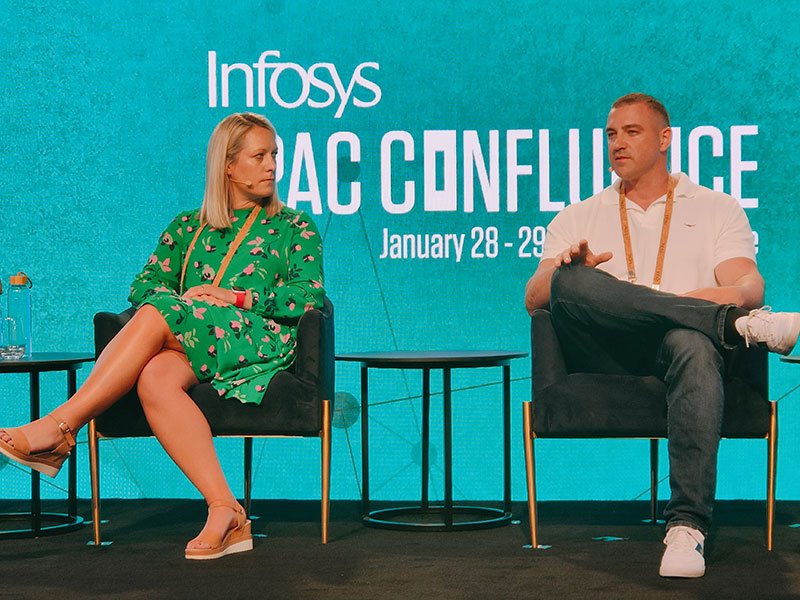The next digital frontier will see the combination of leading-edge technologies to address the ‘colossal’ demand for products that help deliver ESG commitments, a panel of experts have said.
As part of the Infosys Confluence conference in Melbourne in late January, industry leaders discussed the next digital frontier and the opportunities and challenges this will present.
Infosys Consulting managing partner Andrew Duncan, Kmart Group CIO Brad Blyth and Spark New Zealand product director Tessa Tierney discussed how emerging technologies like artificial intelligence and machine learning are being combined across a number of industries.
“For many leaders, a technology-powered innovation and bold new approaches are what will future-proof the business agenda and transform organisations,” Mr Duncan said.

According to Ms Tierney, the next big technological shift will be in the combination of recently developed and emerging technologies. “It’s the excitement of the convergence right now – 5G combined with IoT and cloud and data,” she said.
“That’s where we see the real growth agenda in innovation happening. It’s about where these technologies collide right across the business value chain to increase productivity, reduce risk, increase compliance and grow revenues across our country.”
Ms Tierney pointed to the use of cameras in Christchurch’s national forest as an example, which are working in tandem with other technologies to help with the early detection of fires.
With environmental, social and corporate governance (ESG) concerns now top of mind for many businesses, these emerging technologies are being closely looked at for how they can contribute.
“The colossal uptake of ESG policies starts with a data platform to get insights into how the business is performing,” said Mr Duncan.
One area in which such new technologies will be crucial is in the fight to combat climate change.
Ms Tierney said her organisation commissioned research on the role of digital technology in helping New Zealand reach its goal of reducing emissions by 17 million tonnes in the next seven years.
“It found that 7 million tonnes can be reduced using digital technologies. That’s 42 per cent of the nation’s emissions reduced through digital technologies,” Ms Tierney said.
“That’s a significant role that we need to play as technology leaders and businesses across APAC – to make sure that we look at technology as a way to enhance the way we do business, to reduce our footprint and to help our customers get there too.”
In the retail space, the convergence of new technologies is helping companies to better tailor the shopping experience to individuals.
“The next digital frontier is the combination of these technologies to create something new – that’s really interesting,” Mr Blyth said. “In a large store environment where the lowest price is guaranteed, using technologies to unlock these opportunities depends on people breaking these processes,” he said.
“It’s about how to use technology to make those decisions that people are making every day, to take out the standard processes and come up with formulas for specific processes that give us the answers.
“It’s digitising the day-to-day experiences that combine the digital and the physical to make more convenient experiences for our customers.”
The collection of data goes hand in hand with the use of these new technologies, but this needs to be done in a careful and safe way, Mr Blyth said.
“We’ve been saying for a long time that data is the new oil, and we need to go and mine it. But now, asking for data when you don’t need it or there’s not a clear purpose is not a good idea,” he said.
“It’s not good for businesses or for customers. You need to be taking the time to understand what you’ve got and how to use it, that’s the foundational starting point. Once you’ve got the data, you need to put in some sort of management or understanding platform.
“Understanding what data you have and what it’s doing is just as important as having the data itself. Getting that base level of understanding in place is really important.”
Mr Duncan said having strong controls and strategies around data use is crucial in the next digital frontier.
“According to Infosys’ Digital Radar report, a strong data strategy is essential to drive growth and innovation,” he said. “Kmart has recently invested in a digital platform and built a team around it to provide insightful and meaningful analytics.”
This article was produced as part of a partnership between InnovationAus.com and Infosys. An InnovationAus.com representative attended the Confluence conference as a guest of Infosys.
Do you know more? Contact James Riley via Email.
